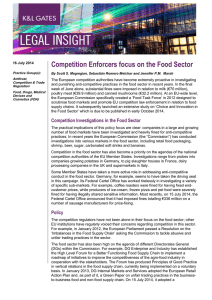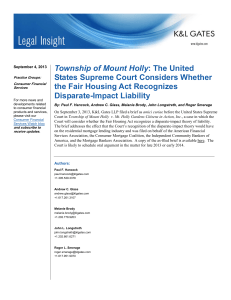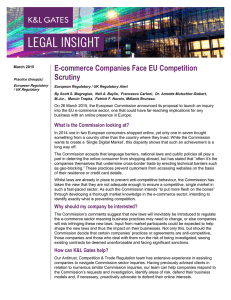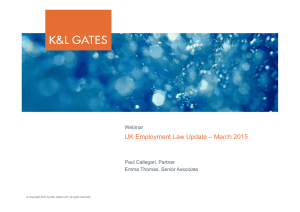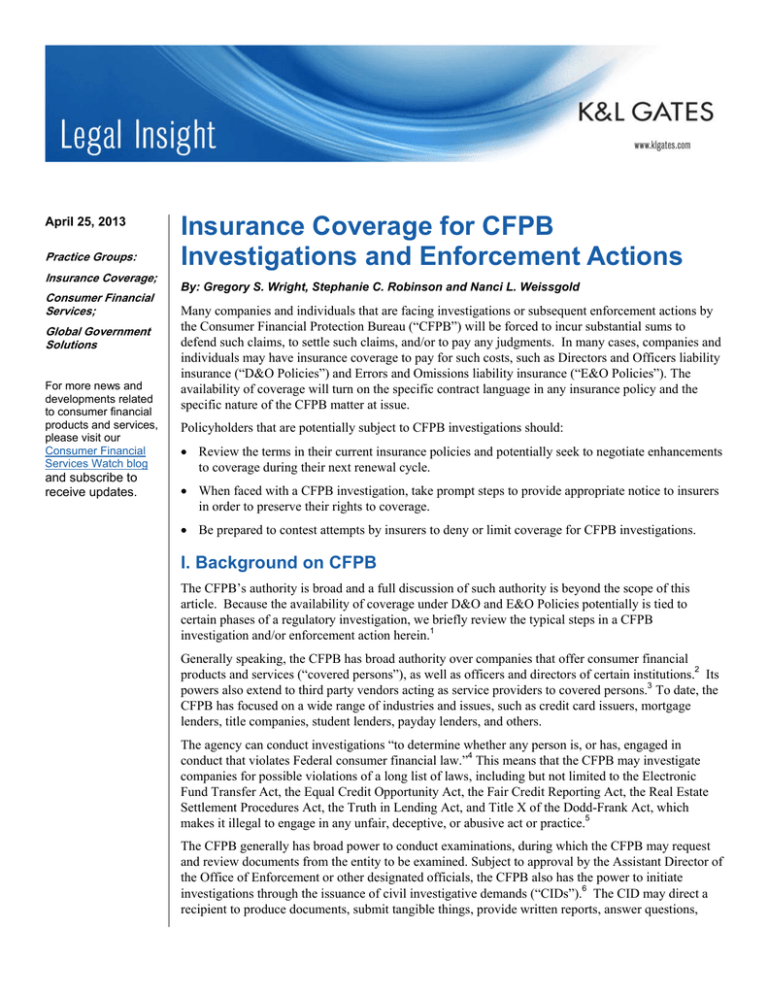
April 25, 2013
Practice Groups:
Insurance Coverage;
Consumer Financial
Services;
Global Government
Solutions
For more news and
developments related
to consumer financial
products and services,
please visit our
Consumer Financial
Services Watch blog
and subscribe to
receive updates.
Insurance Coverage for CFPB
Investigations and Enforcement Actions
By: Gregory S. Wright, Stephanie C. Robinson and Nanci L. Weissgold
Many companies and individuals that are facing investigations or subsequent enforcement actions by
the Consumer Financial Protection Bureau (“CFPB”) will be forced to incur substantial sums to
defend such claims, to settle such claims, and/or to pay any judgments. In many cases, companies and
individuals may have insurance coverage to pay for such costs, such as Directors and Officers liability
insurance (“D&O Policies”) and Errors and Omissions liability insurance (“E&O Policies”). The
availability of coverage will turn on the specific contract language in any insurance policy and the
specific nature of the CFPB matter at issue.
Policyholders that are potentially subject to CFPB investigations should:
Review the terms in their current insurance policies and potentially seek to negotiate enhancements
to coverage during their next renewal cycle.
When faced with a CFPB investigation, take prompt steps to provide appropriate notice to insurers
in order to preserve their rights to coverage.
Be prepared to contest attempts by insurers to deny or limit coverage for CFPB investigations.
I. Background on CFPB
The CFPB’s authority is broad and a full discussion of such authority is beyond the scope of this
article. Because the availability of coverage under D&O and E&O Policies potentially is tied to
certain phases of a regulatory investigation, we briefly review the typical steps in a CFPB
investigation and/or enforcement action herein.1
Generally speaking, the CFPB has broad authority over companies that offer consumer financial
products and services (“covered persons”), as well as officers and directors of certain institutions.2 Its
powers also extend to third party vendors acting as service providers to covered persons.3 To date, the
CFPB has focused on a wide range of industries and issues, such as credit card issuers, mortgage
lenders, title companies, student lenders, payday lenders, and others.
The agency can conduct investigations “to determine whether any person is, or has, engaged in
conduct that violates Federal consumer financial law.”4 This means that the CFPB may investigate
companies for possible violations of a long list of laws, including but not limited to the Electronic
Fund Transfer Act, the Equal Credit Opportunity Act, the Fair Credit Reporting Act, the Real Estate
Settlement Procedures Act, the Truth in Lending Act, and Title X of the Dodd-Frank Act, which
makes it illegal to engage in any unfair, deceptive, or abusive act or practice.5
The CFPB generally has broad power to conduct examinations, during which the CFPB may request
and review documents from the entity to be examined. Subject to approval by the Assistant Director of
the Office of Enforcement or other designated officials, the CFPB also has the power to initiate
investigations through the issuance of civil investigative demands (“CIDs”).6 The CID may direct a
recipient to produce documents, submit tangible things, provide written reports, answer questions,
Insurance Coverage for CFPB Investigations and
Enforcement Actions
and/or appear to provide testimony under oath. The demands may be enforced in district court. The
agency has a duty to advise any person compelled to furnish discovery materials “of the nature of the
conduct constituting the alleged violation that is under investigation and the provisions of law
applicable to such violation.”7
Before the Office of Enforcement recommends that the CFPB commence enforcement proceedings,
the Office of Enforcement has the discretion to “give the subject of such recommendation notice of
the nature of the subject’s potential violations and may offer the subject the opportunity to submit a
written statement in response.”8
The CFPB has broad power to bring administrative enforcement proceedings; refer matters to
appropriate federal, state or other governmental agencies; or file lawsuits in federal court.9 The CFPB
has power to seek “any appropriate legal or equitable relief with respect to a violation of Federal
consumer financial law,” including but not limited to damages or other monetary relief, civil monetary
penalties, disgorgement, rescission or reformation of contracts, etc.10
Given the nature of the process, companies often incur substantial costs in defending an investigation,
even prior to the commencement of any enforcement proceeding or lawsuit. Investigations can cause a
significant strain on company resources, requiring staff time, assistance from outside counsel, and the
use of vendors to process documents in accordance with the CFPB’s exacting document production
specifications.
II. Potential Scope of Insurance Coverage for Investigations
In many cases, policyholders may have coverage under their D&O and E&O Policies for CFPB
investigations and enforcement proceedings. The potential for coverage for regulatory investigations
varies widely by insurer and by policy. Each insurer typically has developed its own standard forms
(which vary widely with respect to coverage for investigations), and many policies are then modified
by endorsement. In many cases, the terms of coverage may be negotiable during the renewal process.
As such, the availability of coverage for CFPB investigations will turn on the specific facts and
specific policy at issue.
For example, some D&O Policies afford coverage for “Loss arising from a Claim alleging Wrongful
Acts,” such as negligence, misrepresentations, breaches of duties, and other acts, errors, or
omissions.11 Similarly, E&O Policies may cover Loss arising from a Claim alleging Wrongful Acts
committed while providing professional services. In many policies, insurers will use a definition of
professional services that is industry-specific.
D&O Policies and E&O Policies are generally triggered by the filing of a “Claim.” The definition of
Claim varies widely, including but not limited to the following:
Some policies may not cover investigations at all.
Some policies cover only Insured Persons with respect to regulatory investigations.
Some policies apply upon commencement of a formal investigation or after service of a subpoena
or similar document.
Some policies apply when the regulator provides some notice that an enforcement proceeding may
be commenced against an Insured.
Some policies apply if there has been a request for a tolling agreement.
2
Insurance Coverage for CFPB Investigations and
Enforcement Actions
Generally speaking, courts have adopted canons of construction that require provisions granting
coverage to be construed broadly, exclusions to coverage to be construed narrowly, and ambiguities to
be construed against the insurance company that drafted the language at issue. Courts also should
construe insurance policies to comport with a policyholder’s reasonable expectations based on
regulatory schemes that apply to the policyholder.
Based on such principles, many courts have held that policyholders are entitled to coverage for the
costs of defending regulatory investigations in other contexts and have rejected insurer attempts to
avoid their obligations to cover such Claims. For example, in MBIA v. Federal Insurance Co., 12 the
Second Circuit held that a policyholder was entitled to coverage for the costs of responding to a
subpoena issued by the New York Attorney General. In that case, the policy covered certain
“regulatory proceeding[s] … commenced by a … formal or informal investigative order or similar
document.” In so holding, the court rejected the insurer’s “crabbed view” that a subpoena is a “mere
discovery device,” holding that a business person would view a subpoena as a formal or informal
investigative order. Similarly, in National Stock Exchange v. Federal Ins. Co., 13 a district court held
that the policyholder was entitled to coverage for the costs of defending an SEC investigation after the
SEC issued a formal order. In that case, the policy covered “formal regulatory proceedings
commenced by a formal investigation order.” The insurer argued that the SEC’s Formal Order did not
trigger coverage on the grounds that an SEC investigation could not be a “proceeding” (which the
insurer argued was limited to SEC enforcement actions). The court rejected this argument out of hand,
reasoning that if the insurer had wanted to exclude formal investigations, it could have drafted its
policy more clearly.
Again, the availability of coverage will be determined on a claim-by-claim basis, but policyholders
facing CFPB claims potentially can take advantage of case law addressing coverage for other types of
regulatory investigations. Further, in the context of applying policy language to CFPB investigations,
insurers and courts should consider the formal process related to the issuance of the CID, the penalties
associated with failure to comply with the CID, and the fact that the CFPB is required to provide
notice of “alleged violations” when the CID is issued. Under many policies, these requirements may
meet the definition of Claim.
III. Other Coverage Issues
In addition to the issue of whether the definition of Claim includes regulatory investigations,
numerous other issues may impact the ability to obtain coverage for CFPB investigations and
enforcement actions.
Notice. Many policies require the policyholder to report any Claim “as soon as practicable.” Insurers
often will attempt to contest coverage if they believe that a policyholder did not meet its duty to do
this. While policyholders often will have grounds to dispute such arguments, policyholders should
carefully consider if and when to provide notice of any CFPB matter in order to preserve their rights
to coverage.
Definition of Loss. D&O and E&O Policies typically cover “Loss,” which is often defined to include
reasonable “Defense Costs” in defending or investigating a Claim, as well as certain damages,
settlements, judgments, etc. The definition of Loss varies by policy, but coverage may vary with
respect to certain types of relief such as fines and penalties or multiplied damages. In certain policies,
coverage may be available provided that relevant state law does not prohibit such coverage as a matter
of public policy. Even if a policy excludes certain “fines or penalties” from the definition of Loss, the
meaning of this policy language is often disputed. For example, certain courts will conduct a detailed
3
Insurance Coverage for CFPB Investigations and
Enforcement Actions
examination of the statutory purpose behind the “fine” at issue and will distinguish between “fines”
that are designed to compensate a plaintiff (potentially covered) and others that are designed to punish
the defendant (potentially not). Further, insurers often will argue that public policy prohibits coverage
for any relief that is labeled as “disgorgement” or “restitution.” But again, courts have not always
agreed and/or have limited this “public policy exception” to narrow circumstances, such as when a
criminal is forced to return an ill-gotten gain.
Exclusions. Of course, D&O and E&O Policies typically contain numerous exclusions and
conditions that may limit coverage. Such terms would need to be analyzed in the context of a specific
claim. Generally speaking, when faced with a new type of exposure (such as CFPB investigations),
insurers often tend to start by denying coverage whenever possible. As seen above, courts have
rejected attempts by insurers to limit their contractual obligation to cover other types of regulatory
investigations in certain cases. Even if insurers initially respond with denials, policyholders should be
prepared to advocate their positions through negotiations or coverage litigation in order to receive the
full benefit of their policies.
Renewals. In addition, in many cases, the terms of D&O and E&O Policies may be negotiable during
the renewal process. Even if they are not currently facing a CFPB investigation, policyholders should
consider reviewing the terms in their existing policies and/or seeking to add endorsements during the
renewal cycle. In certain cases, small changes can be outcome determinative when a Claim is filed.
IV. Summary
D&O and E&O Policies may be a valuable corporate asset to recoup losses incurred in CFPB
investigations and enforcement actions. Policyholders that are facing CFPB inquiries should carefully
review the terms of their existing insurance policies and take steps to preserve and maximize their
odds of obtaining coverage.
Authors:
Gregory S. Wright
gregory.wright@klgates.com
+1.202.778.9250
Stephanie C. Robinson
stephanie.robinson@klgates.com
+1.202.778.9856
Nanci L. Weissgold
nanci.weissgold@klgates.com
+1.202.778.9314
4
Insurance Coverage for CFPB Investigations and
Enforcement Actions
1
We note that, although this alert focuses on insurance coverage for CFPB investigations, a similar analysis would apply
in the context of actions taken by other governmental agencies.
2
See, e.g., Dodd-Frank Wall Street Reform and Consumer Protection Act (“Dodd-Frank Act”) at §§ 1002(6) (defining
“covered person”), 1002(25) (defining “related person”), 1024-1026 (describing the CFPB’s supervision and enforcement
authority over various types of entities), 1036 (making it unlawful to violate a federal consumer financial law or engage in
any unfair, deceptive, or abusive act or practice), 1052-1054 (describing the CFPB’s investigative, adjudicative, and
litigation authority).
3
See CFPB Bulletin 2012-03 (Service Providers) for the CFPB’s analysis of service provider relationships.
4
See CFPB Supervision and Examination Manual (Oct. 2012), Overview (“Manual”), at 7 (citing Dodd-Frank Act at §
1051).
5
Id. at 1-2.
6
See Dodd-Frank Act § 1053.
7
12 C.F.R. § 1080.5.
8
See CFPB Bulletin 2011-04 (Enforcement), Early Warning Notice.
9
See Manual, at 7.
10
Id.
11
These coverages may vary based on industry and type of entity.
12
MBIA v. Fed. Ins. Co., 652 F.3d 152 (2d Cir. 2011).
13
Nat’l Stock Exch. v. Fed. Ins. Co., 2007 WL 1030293 (N.D. Ill. 2007).
5
Consumer Financial Services Practice Contact List
K&L Gates’ Consumer Financial Services practice provides a comprehensive range of transactional,
regulatory compliance, enforcement and litigation services to the lending and settlement service
industry. Our focus includes first- and subordinate-lien, open- and closed-end residential mortgage
loans, as well as multi-family and commercial mortgage loans. We also advise clients on direct and
indirect automobile, and manufactured housing finance relationships. In addition, we handle
unsecured consumer and commercial lending. In all areas, our practice includes traditional and ecommerce applications of current law governing the fields of mortgage banking and consumer
finance.
For more information, please contact one of the professionals listed below.
LAWYERS
Boston
R. Bruce Allensworth
Irene C. Freidel
Stanley V. Ragalevsky
Brian M. Forbes
Andrew Glass
Sean P. Mahoney
Phoebe Winder
Charlotte
John H. Culver III
Amy Pritchard Williams
Chicago
Michael J. Hayes Sr.
Dallas
David Monteiro
Miami
Paul F. Hancock
New York
Elwood F. Collins
Steve H. Epstein
Drew A. Malakoff
Pittsburgh
Melissa J. Tea
San Francisco
Jonathan Jaffe
Amanda D. Gossai
Seattle
Holly K. Towle
Sydney
Andrea P. Beatty
Daad Soufi
Abhishek Bansal
Jason Vongratsavi
Washington, D.C.
Costas A. Avrakotos
David L. Beam
Holly Spencer Bunting
Melanie Brody
bruce.allensworth@klgates.com
irene.freidel@klgates.com
stan.ragalevsky@klgates.com
brian.forbes@klgates.com
andrew.glass@klgates.com
sean.mahoney@klgates.com
phoebe.winder@klgates.com
+1.617.261.3119
+1.617.951.9154
+1.617.951.9203
+1.617.261.3152
+1.617.261.3107
+1.617.261.3202
+1.617.261.3196
john.culver@klgates.com
amy.williams@klgates.com
+1.704.331.7453
+1.704.331.7429
michael.hayes@klgates.com
+1.312.807.4201
david.monteiro@klgates.com
+1.214.939.5462
paul.hancock@klgates.com
+1.305.539.3378
elwood.collins@klgates.com
steve.epstein@klgates.com
drew.malakoff@klgates.com
+1.212.536.4005
+1.212.536.4830
+1.216.536.4034
melissa.tea@klgates.com
+1.412.355.8385
jonathan.jaffe@klgates.com
amanda.gossai@klgates.com
+1.415.249.1023
+1.415.882.8020
holly.towle@klgates.com
+1.206.370.8334
andrea.beatty@klgates.com
daad.soufi@klgates.com
abhishek.bansal@klgates.com
jason.vongratsavi@klgates.com
+61.2.9513.2333
+61.2.9513.2300
+61.2.9513.2300
+61.2.9513.2300
costas.avrakotos@klgates.com
david.beam@klgates.com
holly.bunting@klgates.com
melanie.brody@klgates.com
+1.202.778.9075
+1.202.778.9026
+1.202.778.9853
+1.202.778.9203
6
Consumer Financial Services Practice Contact List
Krista Cooley
Daniel F. C. Crowley
Eric J. Edwardson
Steven M. Kaplan
Phillip John Kardis II
Rebecca H. Laird
Michael J. Missal
Laurence E. Platt
Stephanie C. Robinson
Phillip L. Schulman
David Tallman
Stephen G. Topetzes
Nanci L. Weissgold
Emily J. Booth
Kris D. Kully
Morey E. Barnes Yost
Kathryn M. Baugher
Andrew L. Caplan
Soyong Cho
Shanda N. Hastings
Anaxet Y. Jones
Rebecca Lobenherz
Eric Mitzenmacher
Tori K. Shinohara
Kerri M. Smith
Kathryn S. Williams
krista.cooley@klgates.com
dan.crowley@klgates.com
eric.edwardson@klgates.com
steven.kaplan@klgates.com
phillip.kardis@klgates.com
rebecca.laird@klgates.com
michael.missal@klgates.com
larry.platt@klgates.com
stephanie.robinson@klgates.com
phil.schulman@klgates.com
david.tallman@klgates.com
stephen.topetzes@klgates.com
nanci.weissgold@klgates.com
emily.booth@klgates.com
kris.kully@klgates.com
morey.barnesyost@klgates.com
kathryn.baugher@klgates.com
andrew.caplan@klgates.com
soyong.cho@klgates.com
shanda.hastings@klgates.com
anaxet.jones@klgates.com
becky.lobenherz@klgates.com
eric.mitzenmacher@klgates.com
tori.shinohara@klgates.com
kerri.smith@klgates.com
kathryn.williams@klgates.com
+1.202.778.9257
+1.202.778.9447
+1.202.778.9387
+1.202.778.9204
+1.202.778.9401
+1.202.778.9038
+1.202.778.9302
+1.202.778.9034
+1.202.778.9856
+1.202.778.9027
+1.202.778.9046
+1.202.778.9328
+1.202.778.9314
+1.202.778.9112
+1.202.778.9301
+1.202.778.9215
+1.202.778.9435
+1.202.778.9094
+1.202.778.9181
+1.202.778.9119
+1.202.778.9414
+1.202.778.9177
+1.202.778.9127
+1.202.778.9423
+1.202.778.9445
+1.202.778.9122
PROFESSIONALS
Government Affairs Advisor / Director of Licensing
Washington, D.C.
Stacey L. Riggin
stacey.riggin@klgates.com
+1.202.778.9202
Regulatory Compliance Analysts
Washington, D.C.
Dameian L. Buncum
Teresa Diaz
Robin L. Gieseke
Brenda R. Kittrell
Dana L. Lopez
Patricia E. Mesa
Daniel B. Pearson
Jeffrey Prost
+1.202.778.9093
+1.202.778.9852
+1.202.778.9481
+1.202.778.9049
+1.202.778.9383
+1.202.778.9199
+1.202.778.9881
+1.202.778.9364
dameian.buncum@klgates.com
teresa.diaz@klgates.com
robin.gieseke@klgates.com
brenda.kittrell@klgates.com
dana.lopez@klgates.com
patty.mesa@klgates.com
daniel.pearson@klgates.com
jeffrey.prost@klgates.com
7
Consumer Financial Services Practice Contact List
Anchorage Austin Beijing Berlin Boston Brisbane Brussels Charleston Charlotte Chicago Dallas Doha Dubai Fort Worth Frankfurt
Harrisburg Hong Kong Houston London Los Angeles Melbourne Miami Milan Moscow Newark New York Orange County Palo Alto Paris
Perth Pittsburgh Portland Raleigh Research Triangle Park San Diego San Francisco São Paulo Seattle Seoul Shanghai Singapore Spokane
Sydney Taipei Tokyo Warsaw Washington, D.C. Wilmington
K&L Gates practices out of 48 fully integrated offices located in the United States, Asia, Australia, Europe, the
Middle East and South America and represents leading global corporations, growth and middle-market companies,
capital markets participants and entrepreneurs in every major industry group as well as public sector entities,
educational institutions, philanthropic organizations and individuals. For more information about K&L Gates or its
locations, practices and registrations, visit www.klgates.com.
This publication is for informational purposes and does not contain or convey legal advice. The information herein should not be used or relied upon in
regard to any particular facts or circumstances without first consulting a lawyer.
©2013 K&L Gates LLP. All Rights Reserved.
8

